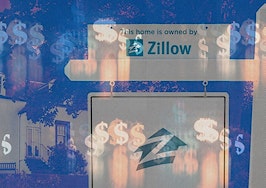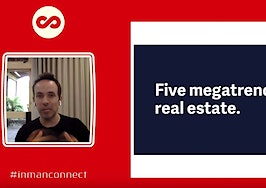This post has been republished with permission from Mike DelPrete.
Real estate portals occupy a dominant position across the industry. Jealous of that power, potential competitors have long tried to challenge the status quo, with limited effect. But now a new threat emerges that, while still a long shot, possesses the greatest potential to disrupt the dominant position of the portals.
The competitive strength of portals
Real estate portals benefit tremendously from network effects, which is the key factor that gives them unprecedented market power and an impregnable moat to repel competition.
Network effects is the phenomenon whereby a service becomes more valuable when more people use it. Online marketplaces and social networks such as Facebook, eBay and Craigslist are classic examples of businesses with network effects.
Businesses that have the benefit of network effects are incredibly difficult to displace. Even if a new entrant’s product is objectively better, a smaller audience of potential buyers and sellers results in an inferior consumer proposition. Sellers want to advertise to the biggest audience possible, and buyers want the largest selection possible.
Real estate portals such as REA Group in Australia and Zillow in the U.S. have a dominant competitive position because they have millions more buyers than any other platform. This key attribute, enabled by network effects, results in leading portals easily maintaining their leadership position against well-funded competition.
The rise of exclusive content
In the past, various competitors have tried a variety of strategies to displace the dominant portals: product differentiation, massive media spend, brokerage alliances and more. But time and again these strategies have failed.
There is one significant risk — an achilles heel — to portals: They don’t control their inventory. Disintermediating the flow of listings to the big portals, through exclusive content, is their greatest threat.
To illustrate this concept, look no further than video streaming services. Netflix, Disney+, Amazon, and AppleTV are investing billions into creating exclusive content. And this content — available on only one streaming platform — is the key differentiator that draws consumers to the service.

When it comes to browsing for real estate, consumers want access to all of the available inventory. If a certain portion of listings are held off-market, available exclusively on another platform, consumer eyeballs will naturally follow.
More than any other strategy, exclusive content has the potential to draw consumer eyeballs away from the dominant portals. But ultimately, while the move is pro-disruptor and anti-portal, it’s also potentially anti-consumer, putting the benefits of a company ahead of consumers.
Industry fragmentation and consumers
For consumers, exclusive content creates a fragmentation of the search and discovery process. It forces buyers to visit more than one site, with no direct benefits. For sellers, it fragments and artificially reduces the number of possible buyers.
The only beneficiary is the portal disruptor — the organization creating and promoting the exclusive content. By bringing more consumers directly to its website, it creates a realignment of power from the portals to the disruptor.
What real estate portals brought to the market was transparency: easy access to all available listings.
In the U.S., they democratized the search process by eliminating the information asymmetry between consumers and real estate agents. Fragmenting inventory across multiple platforms is a step backward into the dark ages of real estate, where consumers no longer have easy access to all available listings.
Case studies
The following case studies illustrate examples of exclusive content being leveraged to break the monopoly powers of portals. And some portals are fighting back, directly and indirectly, by promoting themselves as the most effective place to advertise a home for sale.
There are three case studies of real estate portal challengers attempting to disrupt the top portal: two large brokerages and one challenger portal. The analysis concludes with a case study of what one top portal is doing to push back against exclusive content.
Case study: The challenger portal
OnTheMarket is an upstart, industry-backed portal meant to challenge the dominance of Rightmove and Zoopla in the U.K. It launched in 2015 and has faced a slow, uphill battle to achieve relevance.
One of the legs of its strategy is around exclusive listings: “thousands of new properties a month, 24 hours or more before they are advertised on Rightmove or Zoopla.” According to OnTheMarket, this amounts to between 2,500 and 10,000 properties each month.

The strategy is credited with increasing the portal’s traffic, but after years, its traffic is still a fraction of the dominant portals in the market. It has helped the challenger portal grow and build relevancy in the market, but has done nothing to dent the dominance of Rightmove.
Case study: The traditional brokerage
Howard Hanna is the fourth largest brokerage in the U.S., with over 100,000 transactions closed in 2019. In June of 2019, it launched the Find It First program, where new listings are available only on the company’s website, HowardHanna.com, for a set time before being published on the multiple listing service.

The service launched in an effort to increase traffic to the company’s own website by leveraging exclusive content not available anywhere else; a fact highlighted by the company.

The benefit to potential homebuyers is clear: Register on HowardHanna.com to receive updates on exclusive content before they are posted anywhere else. The benefit to sellers is less clear.
As the company says, “it creates an urgency for their property to be offered first to highly motivated buyers, who are most likely to bring an offer.” But the pool of buyers is a fraction of the entire market: 2.1 million visits in July 2019 compared to over 700 million visits on Zillow.
Howard Hanna’s program offers another benefit for sellers, which is less about exclusive content and more a ding at Zillow’s business model: Prospective buyers should be connected directly with the listing agent, who knows more about the property than anyone else. The benefit to consumers finding a property on HowardHanna.com first is that a connection to the listing agent can be made directly without any intermediaries.
But the program is small. In September 2020, there were fewer than two dozen listings across the Northeast and Midwest. In February 2021, with over 20,000 listings in the Northeast, only 13 Find it First properties were found.
Case study: The tech-enabled brokerage
Compass is the fifth-largest brokerage in the U.S., with over 80,000 transactions closed in 2019. As mentioned in my 2019 strategic analysis of the business, Compass has an active history of promoting exclusive listings, either coming soon or private exclusives.
What sets Compass’ exclusive content strategy apart from others is its traction and promotion. Compass is not shy about promoting exclusive listings on the Compass.com website: It’s featured on the header and highlighted immediately below the search bar.

All search results pages highlight private exclusive listings, which are only available to homebuyers who contact a Compass agent. The fact that there are more listings that can be shown is dangled in front of consumers in a very prominent way.

Clicking through for more information on private exclusives makes it clear that, to see more, you need a Compass agent. The additional listings are not available on “home search websites.”

The concept of a private exclusive listing is not new; what’s new is the degree of in-your-face marketing applied to the program by Compass. In comparison, consider Sotheby’s International Realty, which has no mention of nor listings of private exclusives or coming soons. Sotheby’s is not leveraging the power of exclusive content, while Compass is — in a big, aggressive way.
That fact is sprinkled throughout the Compass website, subtly and overtly. On the search results filter page, visitors are reminded that a large amount of listings are “only on Compass.”

The value proposition for homebuyers (which, by the way, are how the U.S. real estate portals monetize their traffic) is quite clear: exclusive content not available anywhere else.
The value proposition of a coming soon listing for homesellers is less specific: increase exposure, generate buzz and deliver market insights. Again, all to a smaller audience than what the national real estate portals deliver.
With regards to the seriousness of Compass’ program, the numbers paint a clear picture. According to Compass.com, in September of 2020, Compass had over 17,000 listings nationally — with over 2,800 as exclusive content (either Coming Soon or Private Exclusive). These 2,800 listings (16 percent of Compass’ total inventory) were only available on Compass.com or via a Compass agent; none were on Zillow.

And the percentage of listings exclusively on Compass.com is increasing. As of February 2021 there were around 12,000 Compass listings nationally, with 2,800 “only on Compass” — or 23 percent. Nearly a quarter of Compass’ listings are exclusive content.
In one of Compass’ biggest markets, San Francisco, 504 out of 913 total listings were exclusively on Compass, a massive 55 percent.
The concept is perhaps best illustrated in Compass’ own words, through this LinkedIn post by a Compass agent. Note the key phrase: “I have inventory on our platform that will never get listed on Zillow or Redfin. Get a Compass agent…or miss out.”

Case study: The incumbent real estate portal
REA Group operates the dominant Australian portal, realestate.com.au, which also happens to be the world’s most profitable real estate portal. The team at REA understands the value of network effects, and it has built marketing campaigns around having “Millions More Buyers” than the competition.
REA faces a challenge in the Australian market: Property owners who wish to sell their homes “off market.” Similar to Compass’ exclusive listings, these properties never get advertised on a national property portal and reach an audience through existing networks and word of mouth.
REA has met this challenge — and the associated risk to its market-leading position — head on with a series of direct-to-consumer TV advertisements.
The rhetorical message to consumers is clear: Why would you not advertise your biggest asset in the one place buyers will definitely look?
Power moves
The move toward exclusive content is about power. The organizations affecting this change are companies looking to grow revenues and maximize profits. The benefits of a potential shift in consumer eyeballs will accrue to these for-profit companies, at the expense of real estate agents and consumers.
There might be a short-term benefit for real estate agents, by reducing their reliance on a national portal, but that reliance just shifts to a different company. And it’s that company — and no one else — that becomes the distributor of consumer eyeballs and leads to agents. The power remains with a company — and not with an agent.
Ultimately, the consumer might be the biggest loser. The creation of new advertising channels, especially in markets outside of the U.S., means that homeowners will need to pay an additional fee to advertise on those new channels.
And, in the words of Compass, if listings “never get listed on Zillow or Redfin,” millions of potential buyers might never see them, which could lead to less demand and a lower price for a property, a cost paid for by homeowners.
Generating and publishing exclusive content appears to be one of the most effective possible strategies against the portals’ dominance. It’s a relatively new active battleground in the evolving war for the future of real estate. But as these billion-dollar behemoths battle for supremacy of the real estate industry, with agents as their unwitting pawns, consumers might be left paying the price.
Mike DelPrete is a strategic adviser and global expert in real estate tech, including Zavvie, an iBuyer offer aggregator. Connect with him on LinkedIn.







